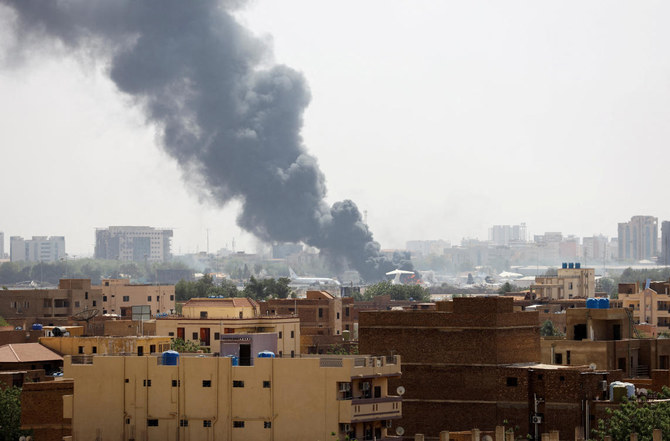KHARTOUM: Strikes by air, tanks and artillery shook Sudan’s capital Khartoum and the adjacent city of Bahri on Friday despite a 72-hour truce extension by the army and the rival paramilitary Rapid Support Forces.
Hundreds of people have been killed and tens of thousands have fled for their lives in a power struggle that erupted on April 15 and disabled an internationally backed transition toward democratic elections.
The fighting has also reawakened a 20-year-old conflict in the western Darfur region where scores have died this week.
In the Khartoum area, heavy gunfire and detonations rattled residential neighbourhoods. Plumes of smoke rose above Bahri. “We hear the sounds of planes and explosions. We don’t know when this hell will end,” said Bahri resident Mahasin Al-Awad, 65. “We’re in a constant state of fear for ourselves and our children.”
The army has been deploying jets or drones on RSF forces spread out in neighborhoods across the capital. Many terrified residents are pinned down by urban warfare with little access to food, fuel, water and electricity.
At least 512 people have been killed and close to 4,200 wounded, according to the UN, but the real toll is thought to be much higher. The Sudan Doctors Union said at least 387 civilians had been killed.
The RSF accused the army of violating a ceasefire brokered by the US and Saudi Arabia with air strikes on its bases in Omdurman, Khartoum's sister city at the confluence of the Blue and White Nile rivers, and Mount Awliya. The army blamed the RSF for violations. The ceasefire is supposed to last until midnight on Sunday.
A Turkish evacuation plane came under fire as it was landing at Wadi Seyidna airport in Omdurman but there were no injuries. Sudan’s army accused the RSF of firing at the plane, damaging its fuel system which was being repaired after the aircraft managed to land safely. The RSF denied that, and accused the army of “spreading lies.”
Lulls in fighting this week allowed some Khartoum residents to leave and foreign evacuations to pick up. Two more evacuation ships arrived in Jeddah on Friday carrying 252 refugees of various nationalities, taking the total number of people brought to safety by Saudi Arabia to about 3,000.
But fighting has otherwise rumbled on through declared ceasefires as both sides appear to have shaky control of their troops.
The violence has sent tens of thousands of refugees across Sudan’s borders and threatens to compound instability across a volatile swath of Africa between the Sahel and the Red Sea.




























